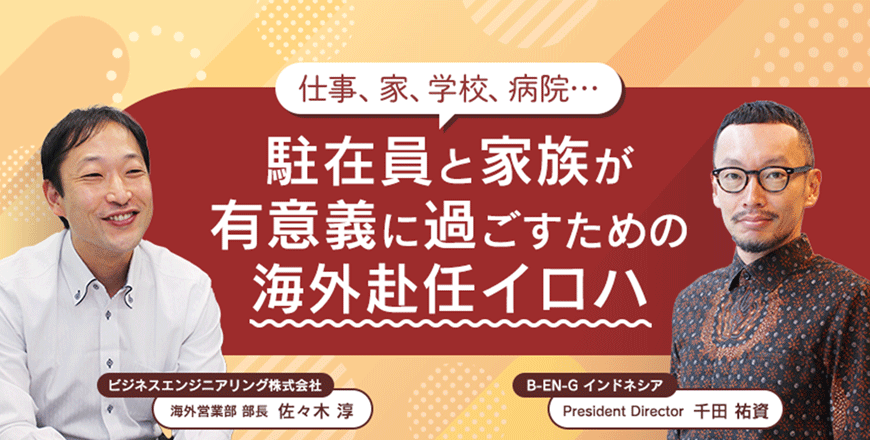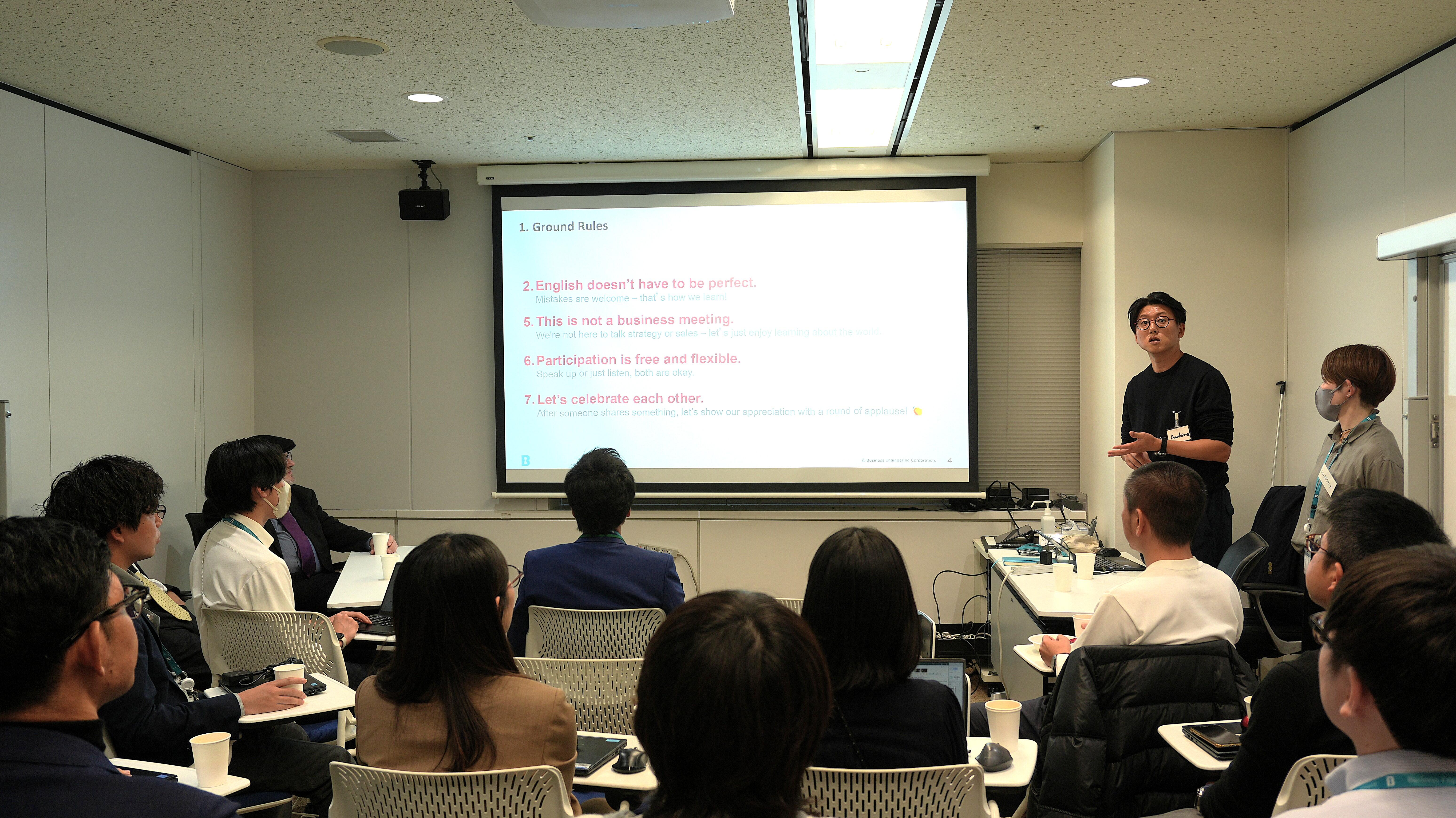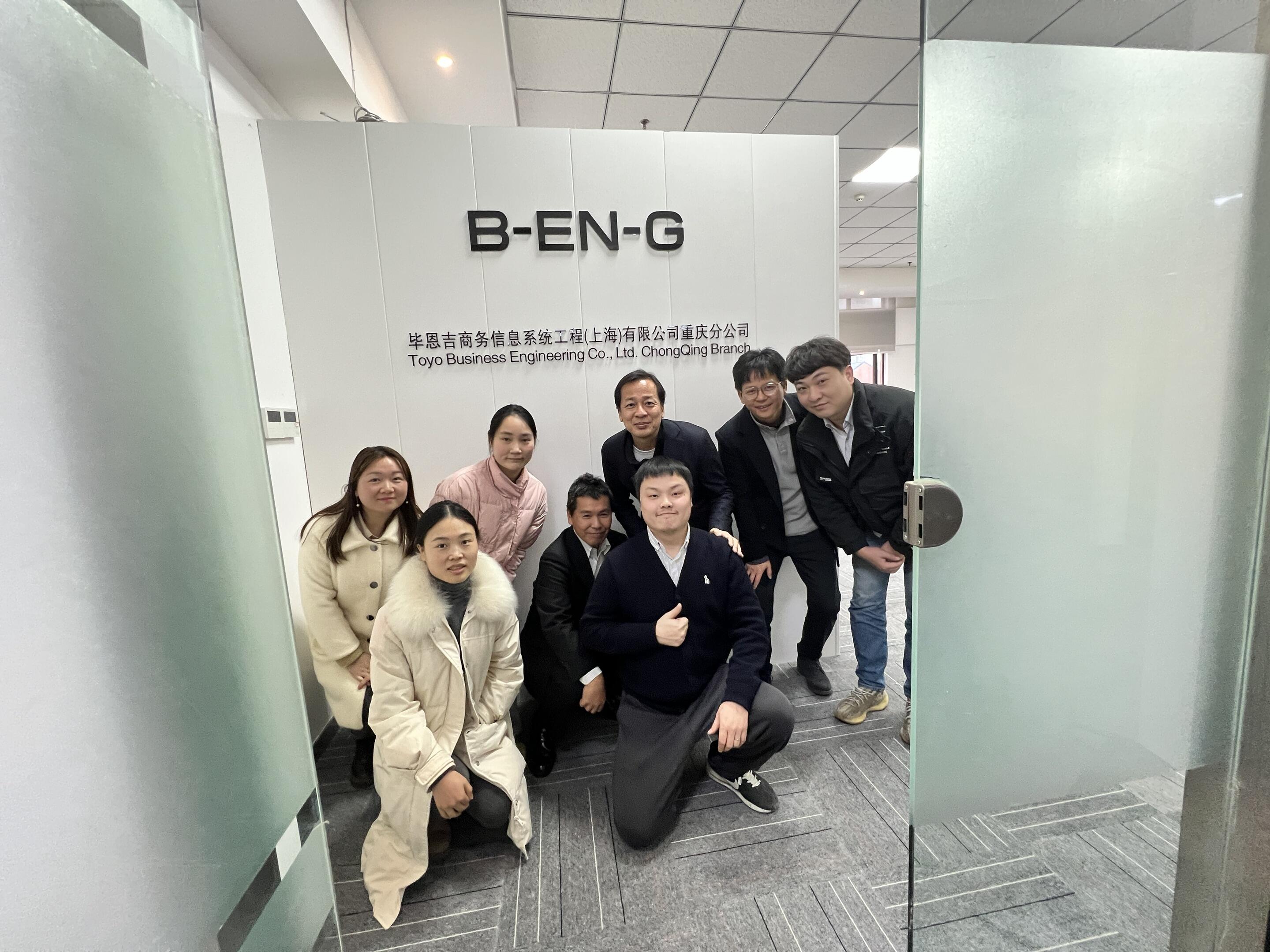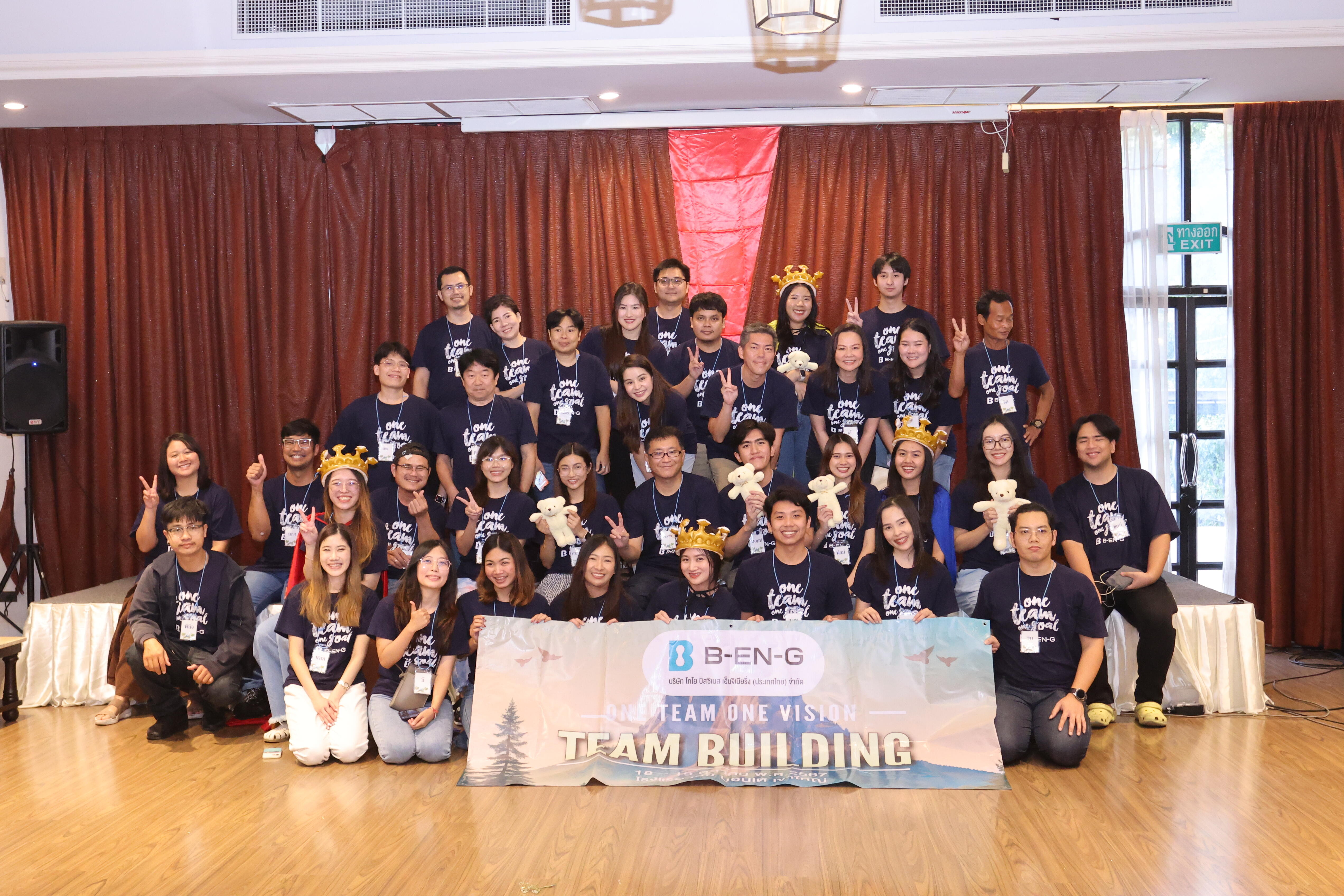"Overseas posting" brings about big changes in the environment, not only in work but also in one's private life. When the time comes to move, one may feel anxious and stressed about new tasks, human relationships, cultural differences, etc. This time, Mr. Sasaki, who has experience of long-term overseas postings in China and Indonesia from the Business Engineering (B-EN-G) Group, and Mr. Senda, who has only recently been posted to Indonesia, talked about preparations before moving, what to know when you are there, and living abroad with your family.
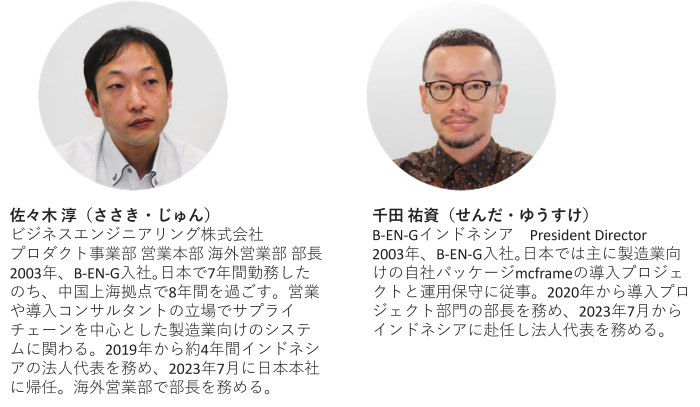
The amount of decision-making is three times that of Japan? It's tough, but rewarding
-First, please tell us about the work you both do.
Jun Sasaki (hereinafter referred to as Mr. Sasaki): I moved to Shanghai in 2010 and served as the sales manager of B-EN-G Shanghai for about eight years. After that, I was transferred to Jakarta in 2019 and was assigned as the representative of B-EN-G Indonesia. I returned to Japan in July 2023 and am currently serving as the head of the overseas sales department at the head office.
Yusuke Senda (hereinafter referred to as Mr. Senda): I joined B-EN-G at the same time as Mr. Sasaki. Since around 2012, I have been working on introducing systems to Japanese companies overseas on a business trip basis. By chance, I became Mr. Sasaki's successor and was assigned to B-EN-G Indonesia as its representative in the summer of last year (2023).
--Since you have both had experience working overseas, I would like to ask you from a business perspective: What differences are there between the work content and working style at the Japanese head office and at an overseas subsidiary?
Mr. Sasaki: First of all, the size of the company is different. In the case of B-EN-G, the Japanese headquarters has over 500 employees, while the Chinese subsidiary has 40 and the Indonesian subsidiary has 20. At the Japanese headquarters, departments are divided according to the work content and role, and it is rare for employees to work beyond the scope of their own department or responsibilities.
On the other hand, at a local subsidiary, the scope of work and responsibility will be much broader. Since you are assigned to the local area as a representative of the head office, your work area will naturally expand and you will be able to gain a variety of experiences with a sense of responsibility to "do whatever the local staff can't do." When I was the representative of the subsidiary, I especially felt that I was "responsible for the livelihoods of the local staff," and I worked with a heavy sense of responsibility every day.
Senda: I worked in Japan for about 20 years before going overseas, so I can personally relate to what Sasaki-san said. In particular, the amount of daily decision-making is about three times as much as when I worked in Japan. B-EN-G Indonesia is in the growth stage as a company, so the speed of business is important. If I don't make decisions, work will come to a halt, so I have to make decisions quickly and accurately.
It's hard work, but I feel it's rewarding. For example, I make all the decisions about salary increases and hiring here. I've already hired a few people, and I place importance on the company culture and compatibility with the other members when hiring.
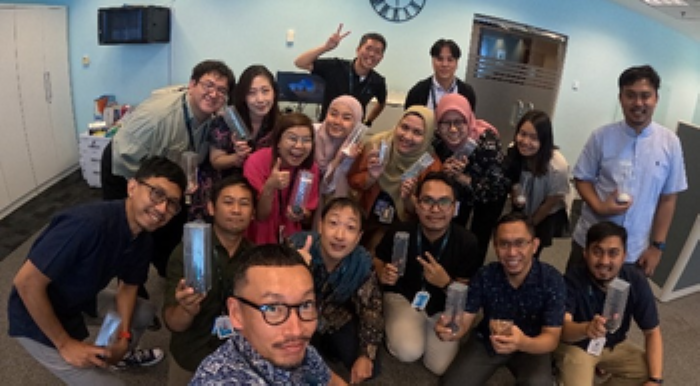
Group photo of B-EN-G Indonesia
Sasaki: I think that the experience of being posted overseas is like a "training period" for a business person.
Senda: I understand. It's like when the protagonist in a shounen manga becomes stronger through training. In a very positive sense.
Mr. Sasaki: That's right. The work of being an expatriate is packed with various experiences that will be useful in building your career in the future, so in that sense it can be said to be a period of training. The term is difficult, and it passes by in a flash because you are so absorbed in it, but when you look back on it later, you will be proud of the fact that you "did your best and saw it through," and it will be a valuable time.
In important situations, communicate with your eyes as well as with your words.
-- The word "training" conjures up images of hardship, but you both have a positive outlook and feel it's rewarding. Mr. Senda, was there any advice you received from Mr. Sasaki that made an impression on you when you took over?
Senda: "The important thing is to communicate with eye contact." The internal language of B-EN-G Indonesia is English. Because communication is in a second language for both parties, it is difficult to convey or understand what the other person or yourself is thinking through words alone. It may seem like a simple thing to say, but I was advised that by looking into the other person's eyes and reading their feelings and thoughts, misunderstandings can be prevented. I practice this every day.
Sasaki: Yes, I did tell them this as one of the items to be handed over. I also remember that Senda-san was taking notes diligently. I myself was particularly conscious of this when I was announcing salary increases and bonuses. The company's performance is the result of the efforts and achievements of each employee, and as the representative of the corporation, I agonize over the results and convey what I think is the best, but there are also times when I have to convey conditions that the other person is not satisfied with. I would look them in the eye and explain why I had received that evaluation, and judge how they took it.
Deepening mutual understanding through company events
-- It's important to "look people in the eye when talking" even among Japanese people, but it's even more important when talking with foreigners. Is there anything you consider important in terms of team building with employees you've hired locally?
Mr. Sasaki: Many companies in Southeast Asia hold company trips, and B-EN-G Indonesia also holds one once a year, which is very exciting every year. On the way there, before you know it, a karaoke contest will start on the bus, and the recreational team competitions are also serious. You can discover a side of your employees that you don't see in the office, such as "this person has a surprisingly strong leadership temperament," and you can also get to know them better.
Senda: Six new employees joined the company last year, and I felt that the company trip helped to bring us closer together. Although it was a limited time of two days, it was effective as a team building activity. There were also good aspects in the preparation stage. We had a new graduate employee among the new members take charge of planning the company trip. I think it was a good opportunity for them to learn the coordination and arrangements necessary for work while also getting closer to each other by planning together with senior employees.
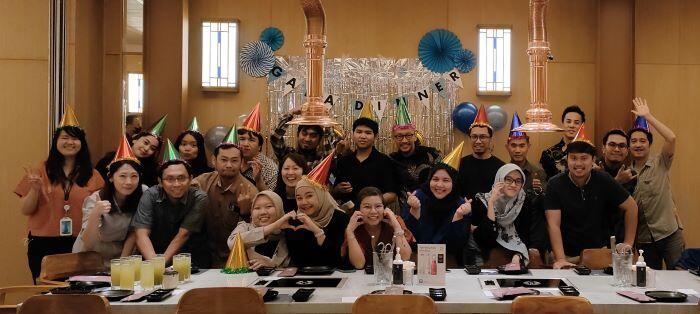
B-EN-G Indonesia dinner party
Daily discussions are important at home. Companies should support this with systems that are in line with the times.
--Now, please tell us about your families. I heard that you both took your families with you when you were posted overseas. What kind of discussions did you have with your families when you decided to be posted overseas?
Mr. Sasaki: I myself had always wanted to work overseas, so I shared that with my wife. My wife also had a positive view of living abroad, so we would talk about it on a daily basis. When the idea of me being posted to Shanghai came up, I was a little worried, as our child was still a year old, but my wife was happy to support me and I was able to make the decision. I think that those who wish to be posted overseas, or those who may be, should discuss the matter with their families on a regular basis, whether they are posting alone or with their family.
Senda: With the increase in dual-income households, I think many families find it difficult to decide to bring their family members with them. In our case, my wife was thinking of returning to work at the same time, but she decided to bring her family with her because it was an occupation that made it easy to return to work even if your career was interrupted. If both parties are company employees, I think the decision has to be made more carefully, so as Sasaki says, it's important to discuss it regularly.
Mr. Sasaki: I hear that there are more and more young employees who don't want to be posted overseas, and I think one of the reasons is that they are thinking about their spouse's career. I think that in the future, it will be fine for husbands to accompany their wives on overseas postings, and companies will be expected to provide systems that take into account all kinds of work styles.
Senda: That's certainly an important point. If the hurdle of being posted abroad is high, you could start with a long-term business trip or improve the business trip system. The experience of collaborating with people from overseas is irreplaceable, and it definitely broadens your world. Companies need to create opportunities for this and design systems that support decisions. B-EN-G has a system called "family accompaniment allowance" that provides allowances when spouses accompany employees, which I found very helpful.
Use tools and social media to gather local information
--As diverse working styles are respected, it is necessary to design a system that takes into consideration not only the expatriate but also their family. How did you gather information about local conditions, including choosing a place to live?
Sasaki: Mr. Senda's prior research on this was incredible.
Senda: As my child was only three years old at the time, I paid close attention to the neighborhood's security and hygiene. You can check property information to a certain extent on real estate companies' websites, but it's hard to know the surrounding living environment.
So I used the Street View feature of Google Maps. Since it allows me to check the surrounding scenery and conditions, I made a selection such as "This apartment is nice, but the surrounding roads look dark," and then went to the location. When I went on a pre-house hunting trip, I brought my GoPro with me and recorded the entire property, and then watched it with my wife when we returned home to make our decision.
Sasaki: It was impressive that you brought a GoPro with you. I'll try to do the same if I'm posted there again. Recently, with the spread of social media, the number of Japanese accounts posting local information has increased. Some accounts are run by expatriates or their wives, and many of them seem to use Instagram in particular. People who are planning to be posted abroad sometimes use social media to gather information and send direct messages from Japan to ask questions.
Senda: This kind of use of the internet and social media may be a necessary skill for future overseas expatriates and their families. My wife also gathers information on Instagram, and has met people she has become friends with in person in Indonesia.
--The use of social media is something that is unique to the modern era. What did you do about your children's school?
Mr. Sasaki: Many people may be more careful about choosing a school than they are about finding a house. There are options such as Japanese schools and international schools, and you can gather information in advance, but I think it's a good idea to actually attend a tour or information session in person. My family put a lot of effort into that as well.
Senda: You can't really know the atmosphere of the teachers or the students until you see them. Ours is still in preschool (equivalent to kindergarten or nursery school for preschoolers), but my wife and children visited several schools before deciding. There's also the difficult question of whether to send your child to a Japanese school or an international school. Mr. Sasaki, your child went to an international school in both China and Indonesia, right? I'd like to ask you this for future reference: how did the Sasaki family decide?
Mr. Sasaki: Yes. My wife and I decided to send our child to an international school even if it cost money. Since we were going to live abroad as a family, we wanted to give our child an environment where he could learn English without stress.
Senda: The English learning environment is one of the attractions of sending your child to an international school. On the other hand, were you worried about their improvement in Japanese?
Mr. Sasaki: At that time, my son was still 0 years old, so there were quite a few. In Shanghai, there is a Japanese supplementary school for international school students, and I sent him there on weekends. He is now 14 years old, and he has no problem with Japanese. His English has improved to the point that when his friends come to play at our house, he says, "Dad, please don't speak to me in English because it's embarrassing," so I think it was a good thing (laughs).
Senda: My 4-year-old child recently scolded me for my English pronunciation (laughs). Children are the most adaptable. They are enjoying life here to the fullest. The only thing I feel bad about is that I can't just let them play at the neighborhood park like I can in Japan. Other than that, they seem to be fine with their friends, environment, and language, and it's a good thing that only overseas can help them develop a diverse perspective in their daily lives.
--When living with your family, the medical environment is likely to be a concern. Have you ever had any problems with hospitals?
Senda: Just the other day, my child had a fever of 40 degrees and was hospitalized for about a week. As a parent, I was very worried, but it was helpful to be able to request an interpreter. Also, my wife told me that there is a wonderful tool called Google Translate, so they were able to communicate with the hospital even when an interpreter was unavailable.
Mr. Sasaki: If you are taking any medicines regularly, it is a good idea to get more prescribed in Japan and check the English names of the medicines, including alternative medicines. Also, dental treatment is not covered by overseas insurance, so many people go to the dentist when they return to Japan temporarily.
Being "open-minded" and not forcing our values on others
--Finally, do you have any advice for people who have just been posted overseas or who are about to be posted overseas?
Mr. Sasaki: I have analyzed the expatriates I have met who are well managed, and I think that those who have respect for the local people tend to do well. I myself was like that at first, but I can't help wanting to expect Japanese values and work styles from the local people. For example, although it may be a bit Showa-era, values like "work first" don't apply in either China or Indonesia.
For the local people, the most important thing is not the company or work, but family. Family is important to Japanese people too, but the sense of it is different. When I understood that, I felt like I was able to truly respect the other person's values, and I felt like I had a deeper understanding of them.
Senda: Indonesians seem to value their families, and it shows in their attitude when they are with customers. Even if they think, "That's outside the scope of the contract, so you don't need to go that far," they are dedicated to their customers. In Japan, I would tell them, "You don't need to go that far," but I want to respect their way of doing things to the extent that it is acceptable. I think that leaving the "should thinking" that is common in Japan behind in Japan will ultimately reduce your stress.
Mr. Sasaki: The employees are also looking to see whether the expatriates are people they can respect. If you get angry or irritated more than necessary, it's hard to gain respect, so it's important to treat them with a generous attitude. I tried to listen to them with a smile, even if it was a little exaggerated.
Senda: It's important to have an open-minded attitude. There are times when you can't do anything about it, like when a road is blocked by a demonstration and you can't get to an important appointment. In times like these, it's important to calmly accept the situation and respond flexibly.
Mr. Sasaki: I said earlier that an overseas assignment is a "period of training," but this also applies to the expatriate himself, his accompanying spouse, and children; it is also a period during which the whole family can grow and deepen their bonds.
Senda: It's good to think of the whole family growing together. When I think about it like that, I think I can cherish my days here even more. At the moment, my children seem to be growing the most in my family, so I want to do my best so that I don't fall behind them.
(Text: Kyodo News Digital)
*This article is current as of February 2024.
